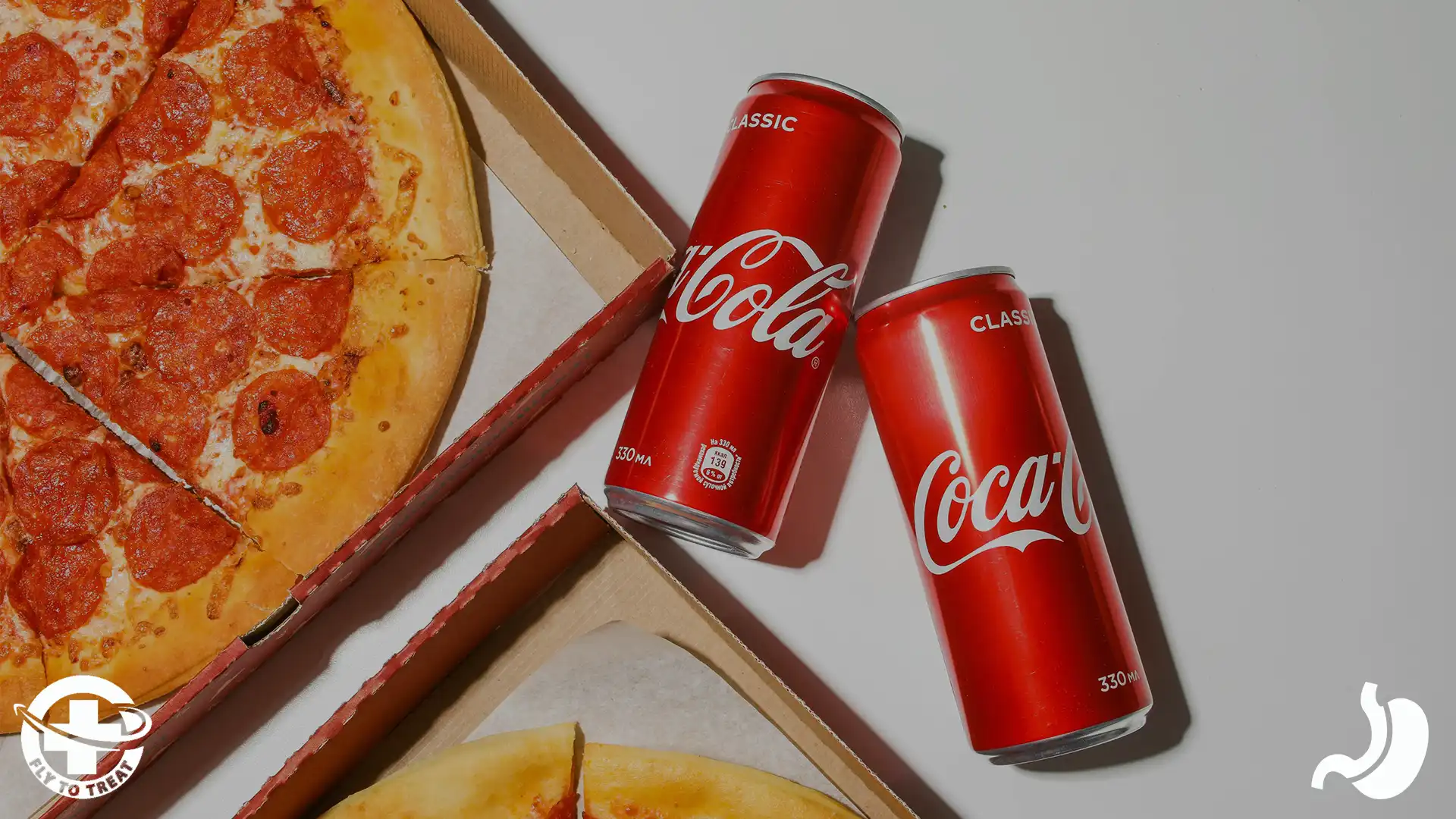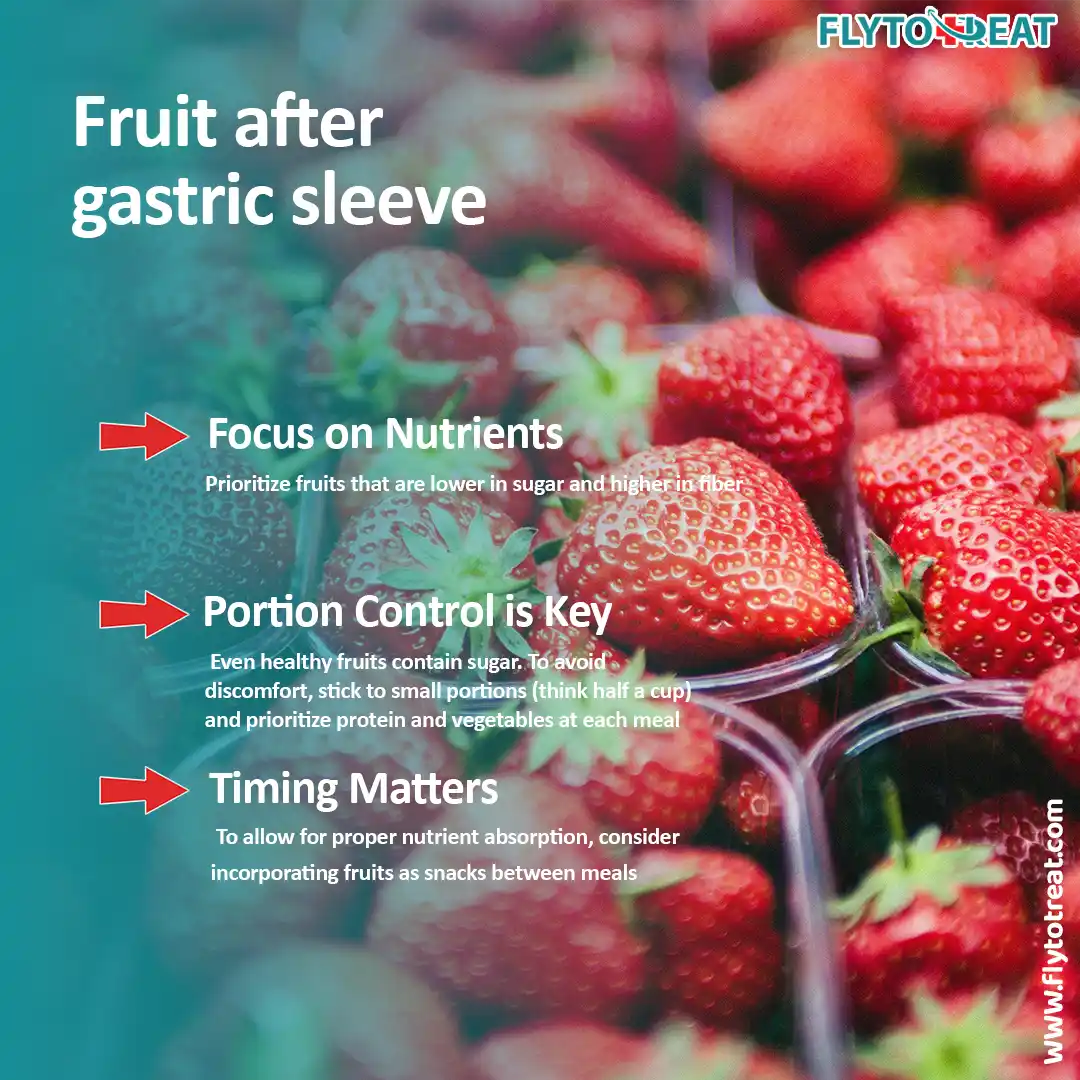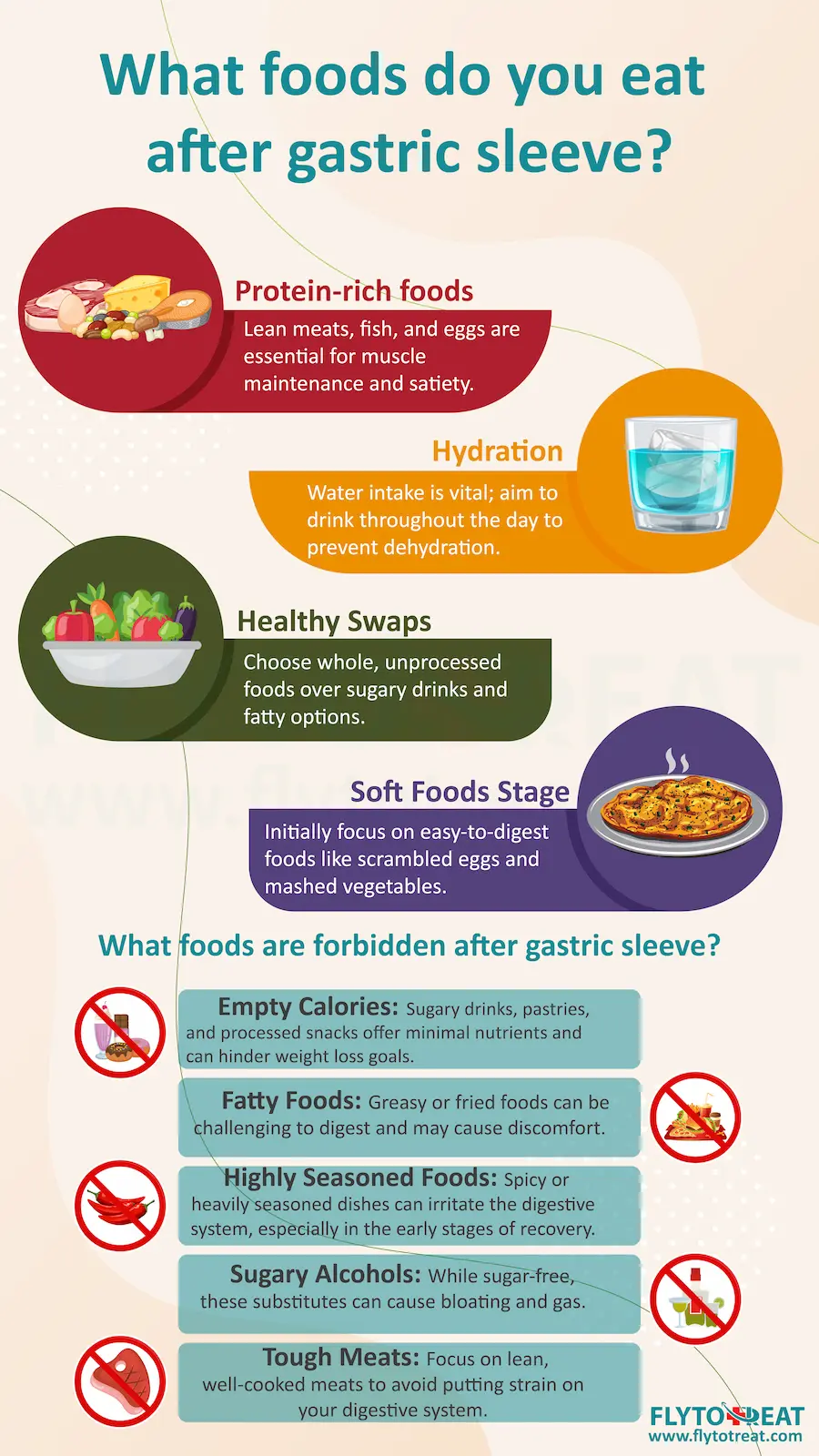
What foods are forbidden after gastric sleeve?
Reviewing the roadmap of food after gastric sleeve surgery presents a unique set of challenges and opportunities for individuals committed to embracing a healthier lifestyle. This comprehensive guide, supported by the expertise of FlyToTreat, delves into the essential aspects of post-operative nutrition, emphasizing the importance of protein-rich foods, hydration, healthy swaps, and mindful eating. As patients transition through various dietary phases—from liquid to soft foods and beyond—the guidance of FlyToTreat's dietitians becomes invaluable. This document aims to provide a roadmap for successful dietary adaptation, ensuring that individuals can make informed choices that support their recovery, long-term health, and weight management goals. With FlyToTreat's support, patients can confidently navigate their new dietary landscape.
Food after gastric sleeve
It is essential to modify your food after gastric sleeve to ensure proper healing and long-term success. This is because your stomach will have been significantly reduced in size, and therefore, it is important to be mindful of the types of foods you consume. It is recommended to prioritize foods that are high in protein, fiber, and nutrients while minimizing foods that are high in fats, sugars, and calories. Some examples of nutrient-dense foods include lean meats, fish, eggs, low-fat dairy, vegetables,
s, and whole grains. Additionally, it is important to stay hydrated by drinking plenty of water throughout the day. With the guidance of your healthcare provider and a registered dietitian, you can create a personalized plan for your food after gastric sleeve surgery that meets your unique needs and goals:
• Protein-rich foods: Lean meats, fish, and eggs are essential for muscle maintenance and satiety.
• Hydration: Water intake is vital; aim to drink throughout the day to prevent dehydration.
• Healthy Swaps: Choose whole, unprocessed foods over sugary drinks and fatty options.
• Soft Foods Stage: Initially focus on easy-to-digest foods like scrambled eggs and mashed vegetables.
• Mindful Eating: Pay attention to portion sizes and your body's fullness cues to avoid discomfort.
Consultation with a dietitian can provide personalized advice and support for navigating your diet after the sleeve surgery.

Soft food after gastric sleeve
The food after the gastric sleeve progresses from liquids to a crucial phase of soft foods. Typically lasting 1-2 months, this stage allows for gentle reintroduction of more diverse textures.
Moving Beyond Liquids:
• Focus on Softness: Think scrambled eggs, cooked, flaked fish, and ground, well-cooked meats that are easy to chew and digest.
• Veggies Get Involved: Mashed potatoes, steamed greens, and other soft, well-cooked vegetables can be incorporated in small portions.
• Protein is King: Protein is a priority for healing and muscle building. Lean meats, fish, and cooked, shredded chicken are excellent options.
Remember:
• Portion Control Matters: These foods should still be mashed, chopped, or blended to a soft consistency. Aim for small portions (1-2 ounces) to avoid discomfort.
• Listen to Your Body: Focus on slow, mindful eating and chew thoroughly. Stop when comfortably full, not stuffed.
By following these tips and consulting your healthcare team, you can navigate the soft food diet stage smoothly and continue your successful food after gastric sleeve surgery. [1] For further exploration, you can read:
Vitamins, minerals, and sleeve gastrectomy
After undergoing sleeve surgery, it is common to have reduced nutrient absorption, and therefore taking supplements is often recommended. Vitamins and minerals after gastric sleeve are crucial for maintaining energy, a strong immune system, and overall health. Common deficiencies include iron, calcium, vitamin D, and B12. Depending on your individual needs, a daily multivitamin, calcium with vitamin D, iron, and possibly B12 injections may be required. Regular blood tests can monitor your vitamin and mineral levels. It is important to consult with your doctor or dietitian to create a personalized supplement plan for your food after gastric sleeve surgery.
Foods to avoid after gastric sleeve surgery
It is important to follow a healthy food after gastric sleeve to achieve effective weight loss. The diet plan typically involves consuming foods rich in protein, fiber, and essential vitamins and minerals. These foods help maintain a healthy balance of nutrients in the body while also reducing the risk of nutritional deficiencies.
However, there are certain foods that one should avoid their food after gastric sleeve surgery. High-fat foods, fried foods, sugary snacks, and processed foods are among the foods to avoid after gastric sleeve surgery. These foods can cause discomfort, nausea, and vomiting, which can lead to complications during the recovery process. It is recommended to also exclude carbonated drinks and alcohol from your food after gastric sleeve, as they can irritate the stomach and cause inflammation.

To ensure a successful weight loss journey, it is important to follow a healthy and balanced food after gastric sleeve surgery. This will not only help in achieving the desired weight loss but also promote overall health and well-being. Here is a breakdown of what to avoid:
• Empty Calories: Sugary drinks, pastries, and processed snacks offer minimal nutrients and can hinder weight loss goals.
• Fatty Foods: Greasy or fried foods can be challenging to digest and may cause discomfort.
• Highly Seasoned Foods: Spicy or heavily seasoned dishes can irritate the digestive system, especially in the early stages of recovery.
• Sugary Alcohols: While sugar-free, these substitutes can cause bloating and gas.
• Tough Meats: Focus on lean, well-cooked meats to avoid putting strain on your digestive system.
Remember:
Consult your doctor or dietitian for a personalized list of foods to avoid based on your needs and recovery process. They can guide you towards a balanced and successful post-surgery diet. You also need to incorporate this diet when you are getting ready for gastric sleeve.
High protein foods after gastric sleeve
Regarding food after gastric sleeve surgery, protein is essential for healing and weight management. Here are some excellent protein sources:
• Lean Mean Machines: Chicken, fish, and turkey are all excellent choices, providing protein with minimal fat.
• Egg-cellent Option: Eggs are a complete protein source, easy to digest, and versatile for breakfast or snacks.
• Dairy Delights: Greek yogurt, cottage cheese, and low-fat milk offer protein with a creamy texture, perfect for snacks or smoothies.
• Plant-Based Picks: Tofu, lentils, and beans are great options for vegetarians and vegans, providing protein and fiber.
Remember:
Prioritize protein at every meal to feel fuller for longer and support muscle building. Your doctor or dietitian can provide personalized recommendations to ensure you meet your protein needs on your post-surgery diet.
How much to eat after gastric sleeve
After surgery, portion sizes will be very small, around 2-4 ounces (¼ cups), and gradually increase over time. By one year, you may be able to eat 8-12 ounces (1-1.5 cups) per meal.
Protein should be prioritized at each meal.
It is critical to follow a doctor-created plan to avoid nutrient deficiencies. In the first two months after surgery, patients should consume 300-600 calories per day with a focus on thin and thick liquids. Daily intake shouldn't exceed 1,000 calories. Doctors recommend consuming at least 65-75 grams of protein daily.
Here are some additional tips for portion control after weight loss surgery:
o Use a measuring cup or scale to measure your food.
o Focus on whole foods, especially protein and vegetables.
o It is recommended to eat your food slowly and to stop eating once you feel full.
o Don't compare your portions to others.
It is essential to consult with your doctor or dietitian to create a personalized plan for your food after gastric sleeve surgery.
Conclusion
As we conclude this guide on foods to avoid after gastric sleeve surgery, it is clear that the path to recovery and long-term health is multifaceted, requiring a commitment to nutritional excellence and mindful eating. FlyToTreat is a pivotal resource, offering expert dietary consultation and support crucial for patients embarking on this transformative journey. The principles outlined in this document—prioritizing protein, hydration, healthy food choices, and portion control—serve as the foundation for a sustainable lifestyle post-surgery. By adhering to these guidelines and leveraging the support of FlyToTreat, patients can look forward to achieving their weight loss goals and enhancing their overall health and well-being. In embracing these dietary adjustments, individuals are not just surviving but thriving, with FlyToTreat by their side every step.
MEDICALLY REVIEWED BY: Dr. Ali Bazazi
AUTHOR: FlytoTreat's team of Authors
25 March 2024 - Updated At: 26 October 2024
Related Articles
Comment





